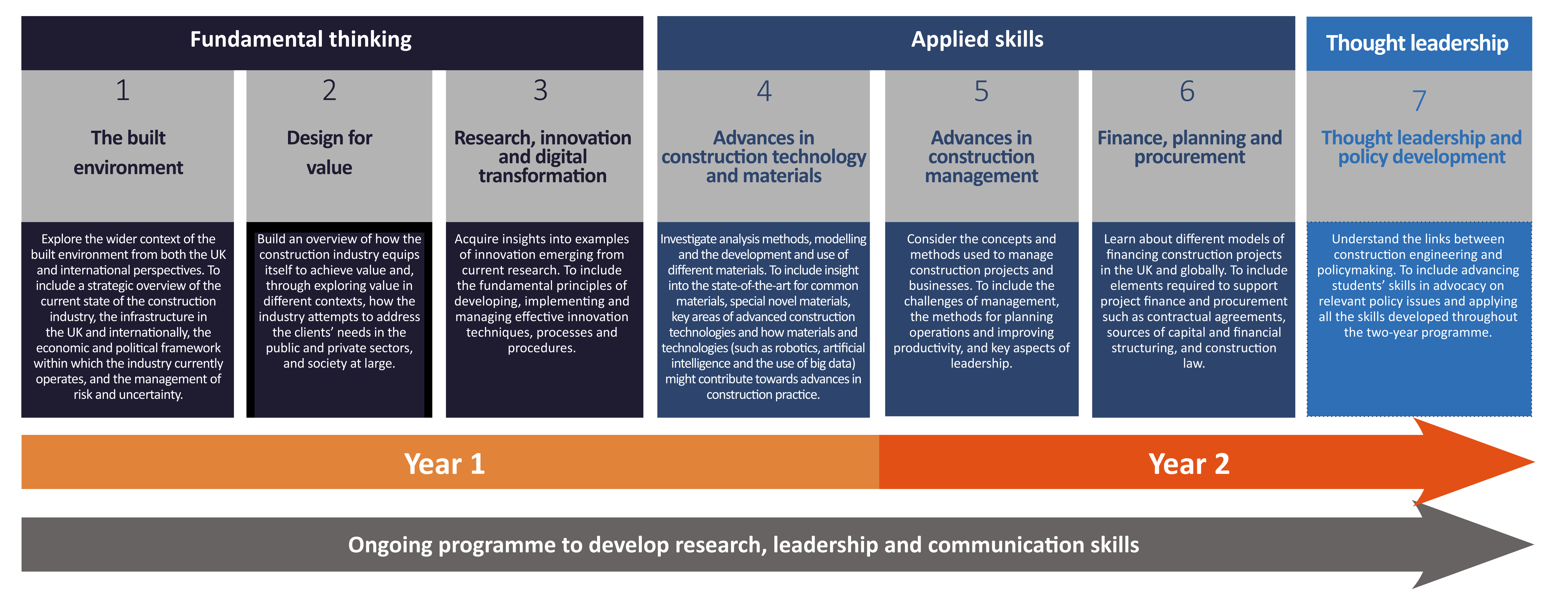Learning outcomes of the CEM
Our prestigious part-time leadership programme is designed to integrate with your work, providing flexibility and convenience for your learning experience while propelling your career forward, and delivering value to your business from the start of the programme and beyond.
The programme is hosted by the University of Cambridge’s Laing O’Rourke Centre for Construction Engineering and Technology in partnership with the Cambridge Judge Business School. It is delivered by top academics from the University of Cambridge and other institutions, working hand in hand with leading industry thinkers and practitioners to provide state-of-the-art learning while encouraging meaningful debate on key industry issues.
The CEM comprises seven evenly distributed residential weeks, spent in Cambridge, with four weeks in the first year and three in the second year. Our residential weeks in Cambridge offer a unique learning experience that goes far beyond the classroom. Instead of lectures and exams, you will immerse yourself in intensive research-focused exploration, combining in-depth discussions, one-to-one supervision, and collaborative peer learning. These weeks provide a challenging yet supportive environment where you are encouraged to test ideas, confront assumptions, and engage critically with both academic staff and peers. Attendance at all residential weeks in person is an essential part of this transformative experience.
Each residential week is focused on a specific theme, supported by an ongoing programme of communication, leadership and research skills development:
- Please see the residential week dates for the 2025 cohort entry.
Assessment of the Master in Construction Engineering
Full and active participation in all course elements is required, including participation in group projects and a presentation for the dissertation. Presentations form part of the formal assessment. However, the CEM is primarily assessed through written work completed between residential weeks. Assignments are as follows:
Year One
- One written case study based on one of the topics covered by the ‘Built Environment’ module - up to 5,000 words.
- Two written essays, each based on one of the topics covered in the ‘Design for Value’ and ‘Research and Innovation' modules - approximately 3,000 words.
Participants need to pass all assignments to progress into year two.
Year two
- One 15,000-word dissertation and a dissertation presentation.
The degree is awarded on the outcome of the dissertation and dissertation presentation.
Topics may be based on an individual’s interests, experience and current employment and are selected with guidance from the student’s Director of Studies (who will be appointed to them by the Course Director). Themes include but are not limited to productivity, procurement, team performance, management processes, adoption of new technologies, risk management, and policy (health and safety, gender equity).
Students will typically receive up to three hours of supervisory support per assignment in year one and eight hours for their research dissertation in year two. In addition, students meet with their Director of Studies each residential week. They are regularly provided feedback on their performance via individual face-to-face and written exchanges with supervisors and the Director of Studies.

